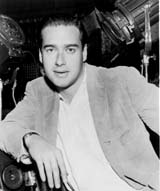Almost everything that Burt Lancaster does, or experiences in John Frankenheimer's, The Train seems real, necessary and interesting. He did all his own stunts in the film, learned to cast driving axel bearings, which we see in the film in a contunous take. Frankenheimer was one of the true masters of the audacious, complicated, continuous scene and this film has many astounding set-pieces. The film is also one of the last great films shot in deep focus black and white (mostly with a 25mm lens) and it is the bold, striking compositions of the intense and vigorous action that elevates the film to an even higher level. Frankenheimer never took the bland, straightforward choices of blocking and positioning the camera in his films - certainly not in the first half of his career and The Train is a veritable textbook in imaginative visual directing.
There is great sense of danger in the film, much like the feeling that The Wages of Fear produces - and indeed in one scene, we see an actual train-crash that smashed nine cameras, and was only captured by one camera which yielded one of the most startling shots in all of Cinema! The whole film has sense of almost reckless daring, but was carefully controlled throughout. The scene where Albert Rémy uncouples the engine from the cars is insane! I can't think of another film where a key actor does something so dangerous on their own, with a stunt double.
But all of these scenes and shots serve the story, which is in itself fascinating. It asks the question: What is more important - irreplaceable works of art or the lives of common human beings? Col. von Waldheim is an unorthodox Nazi, who has a deep admiration for 'decadent' paintings and is willing to save them posess or save them at any cost , regardless of his orders. Paul Labiche knows trains inside out, but a painting means as much to him as "a string of pearls to an ape," but his morals are infinitely more compassionate than von Waldheim, which he makes clear without speech at the end - where, in fact, twenty minutes go by without Lancaster uttering a single word, which was unheard of them of a superstar male actor, but it totally appropriate. It is one of the great performances in all of war/action Cinema, I feel. And his antagonist is the legendary Paul Scofield in his first screen appearance in six years, who is, as always, magnificent. Everyone did a first-rate job on this film, yet only the screenwriters were nominated for the 1966 Oscars (the film was not released until May 1965 in the USA) which is yet another example of Academy madness.
Everything about The Train is unconventional. It was made at a time when other studios and directors would have gone for colour and CinemaScope, Frankenheimer went for deep-focus, black and white 1.66:1, went for authenticity, verisimilitude - no back-projection or models. Arthur Penn actually began the film, but I have never been able to ascertain how much material he shot, or why he was fired, but it would have been a very different movie; Frankenheimer's vigorous, but elegant style is so perfectly right for this film.
One thing that makes some films extra special is those that have many scenes where a process is at work and is shown in detail, seem more powerful. One cannot shown process in any other medium of art. Heist scenes, as in The Asphalt Jungle, Rififi, Le Cercle rouge, etc are prime examples, the escape preparations in Bresson's, A Man Escaped and Becker's, Le Trou are also enthralling and 'make' each movie what it is. The working out of a life-ir-death puzzle, as in Blowup, The Conversation and De Palma's, Blow Out also illustrate the power of the medium. What makes these scenes - 'process of action' - interesting and occassionally powerful, is that they make us look at human interaction with matter is a different, even deeper way. Slow motion cinematography remains one of man's greatest inventions. Before it, we had no idea how fast moving objects worked or behaved. There was over 50 years of gunfire in Cinema, until we saw what a bullet leaving the barrell of a gun looked like, in The Omen (1976). It spins, for one thing. That must have surprised many people.
On the whole and after seeing it for the first time in about six years, I firmly feel that The Train is one of the greatest action films ever made, not only for its audacious crashes, bold style and unintrusive score by Maurice Jarre, but also for it simply being a fascinating and unusual story this is brilliantly acted. The trailer for Die Hard 4 had been in hysterics, but with a sliver of interesting in seeing it. Not any more - it looks as safe as milk, frankly.

"I really, really love directing films." (actual quote!)